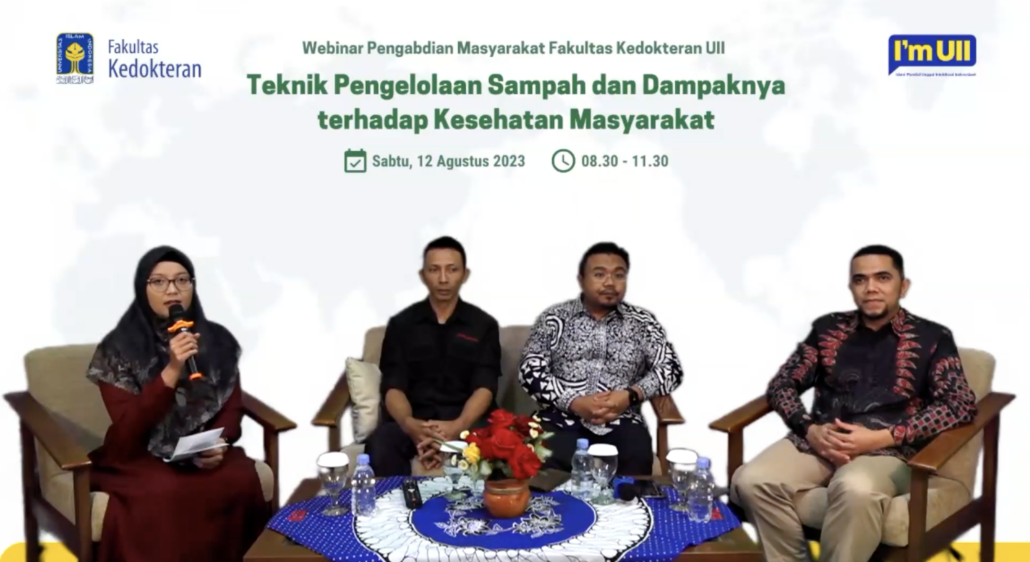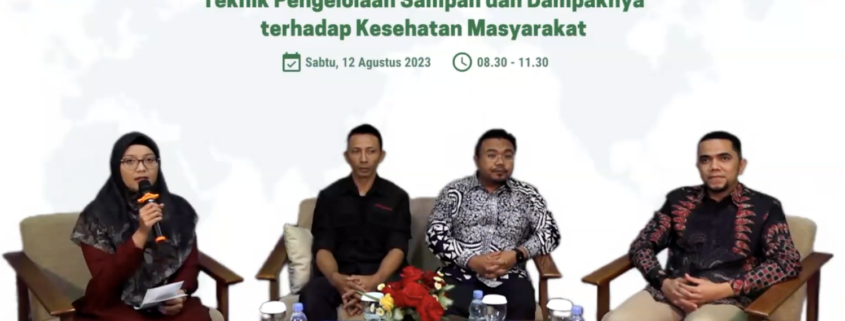Environmental Practitioner: Community Contribution Needed to Reduce Waste

UII – Yogyakarta (14/8) — In an effort to increase public awareness regarding the importance of effective and sustainable waste management, the Faculty of Medicine Universitas Islam Indonesia (UII) held a webinar entitled "Waste Management Techniques: Creating a Clean and Healthy Environment". The webinar, which was held online on August 12 2023, was attended by experts and practitioners in the field of waste management as well as participants from various backgrounds. In this webinar, dr. Laksmi Damayanti hosted the event.
Organic and Inorganic Waste Management Techniques
Dr. Hijrah Purnama Putra, ST, M.Eng, an environmental expert from the Department of Engineering, Faculty of Civil Engineering and Planning, UII, presented the first material with a focus on organic and inorganic waste management techniques. In his presentation, Dr. Hijrah explained various effective ways of managing organic waste and processing inorganic waste. He also highlighted the negative impact caused by improper waste handling on the environment.
Dr. Hijrah also provides practical tips for reducing waste, including the concepts of reduce, reuse and recycle. Dr. Hijrah presents a new concept in an effort to manage waste. "We change 3R to 3Ah, the first is 'Prevent', the second is 'Segregate' and the last is 'Olah'," he explained.
"And remember, the order cannot be reversed, it must be in accordance with the first order of prevention, sorting, then processing.", he added.
The Impact of Garbage on Public Health
The second material was delivered by dr. Sani Rahman Soleman, M.Sc, a doctor and lecturer at the Department of Public Health, FK UII. Dr. Sani reviews the health impacts arising from improper waste management. He explained in detail the possible health problems that could arise due to environmental contamination by waste, including the risk of infectious diseases and allergic reactions. In his presentation, dr. Sani also reminded the participants about the importance of managing hazardous waste such as PCBs (Poly Chlorinated Biphenyls) which are often found in electronic waste. Dr. Sani presents interesting facts about waste management in Japan as examples of practices that deserve appreciation. "In Japan, every Tuesday, they put organic waste in yellow plastic in Kyoto. The transport truck arrives at 7 in the morning, and the organic waste must be available and ready to be collected," said dr. Sani.
Furthermore, dr. Sani explained, "As for non-organic waste, such as plastic and other inorganic materials, they arrange collection on Wednesdays and Fridays. This is quite a sophisticated step in managing waste.”
However, the most interesting aspect is the management of e-waste. dr. Sani gives an overview: “Electronic waste, including wires and batteries, has very strict handling in Japan. People there are not allowed to throw electronic waste anywhere, especially in landfills near their homes. This is an example of how separating waste into different categories, with strict regulations, can have a positive impact on the environment and public health.”
Home Waste Management into Business Land
Tomy Wahyu Pradana, the founder of the Garbage Processing Technique (TM Garbage) in Piyungan, Bantul, Yogyakarta, explained his innovations in waste management. Tomy explained the importance of sorting inorganic waste that is fit for sale and sending it back to the recycling plant. Tomy also explained an interesting innovation in organic waste management, namely by using insects, such as fly soldiers and black soldiers, as organic waste decomposers. "The insect larvae are processed into alternative feed for poultry and fish," he added. This innovation not only reduces the volume of organic waste, but also provides solutions for the sustainable use of natural resources
In closing, Tomy Wahyu Pradana talked about the challenges in managing household waste that should not be ignored. "As for challenges, it's actually more about human resources, especially field workers. Not everyone is willing to work in the field of waste management, especially in studying the types of plastics. Ordinary people are generally only familiar with plastic in general, but in fact there are various types of plastic that must be sorted out carefully.” said Tommy.
Need Community Contribution to Reduce Waste
In conclusion, participants were reminded of the important messages from each speaker. They are invited to contribute in reducing the production of new waste. When generating waste, sorting and reprocessing is not only good for the environment, but also has a positive impact on public health.
All participants are expected to be able to take advantage of the knowledge and insights gained from this webinar to take concrete steps in managing waste more wisely. This webinar ends with a prayer for further awareness in maintaining environmental cleanliness and health. (Three)

